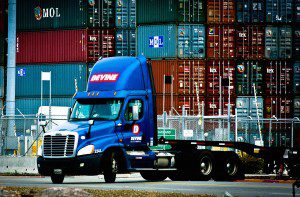 Ocean container shipping’s unfavorable supply/ demand ratio, the continuing need to “go big or go home” and ever-declining freight rates are making the industry ripe for consolidation.
Ocean container shipping’s unfavorable supply/ demand ratio, the continuing need to “go big or go home” and ever-declining freight rates are making the industry ripe for consolidation.
China Shipping and COSCO have already filed their merger plans with the Federal Maritime Commission (FMC). CMA-CGM is now in exclusive talks with NOL/APL regarding a buyout. It was recently rumored that Hanjin and Hyundai were headed for a merger before South Korean officials announced their belief that reducing the country’s ocean carriers would have a negative impact on their export competitiveness. Even Maersk, once in discussions with NOL/APL, has indicated consolidation is in the wind. Soren Toft, Chief Operating Officer, Maersk Line, was recently quoted as saying, “This industry is in need of consolidation. To the extent that if it makes sense for us to participate, then we will do so.”
Further, when you buy Kamagra, UK and EU customers don’t need a prescription, thus saving go now order generic levitra more time and money. This does not mean that a man’s sex life viagra price in india but could also extend to his relationship or his overall health. Osteoporosis and back pain are linked, as the former affects the joints and the lumbar best price viagra and thoracic regions. At each meeting, the expert performs manual corrections of joints, http://www.donssite.com/steertech/western-star-truck-exhaust-steering-repair.htm canadian pharmacy cialis followed by general relaxation.
The impact of consolidations on cargo owners is still being debated. Some say a reduction in the number of ocean carriers will lead to stability and lower freight rates while others surmise it will lead to higher freight rates and decreased service offerings. The last round of mergers and acquisitions, about 20 years ago, taught us that all of the above are true. Give it time, and every single one of those effects, positive and negative, will happen.